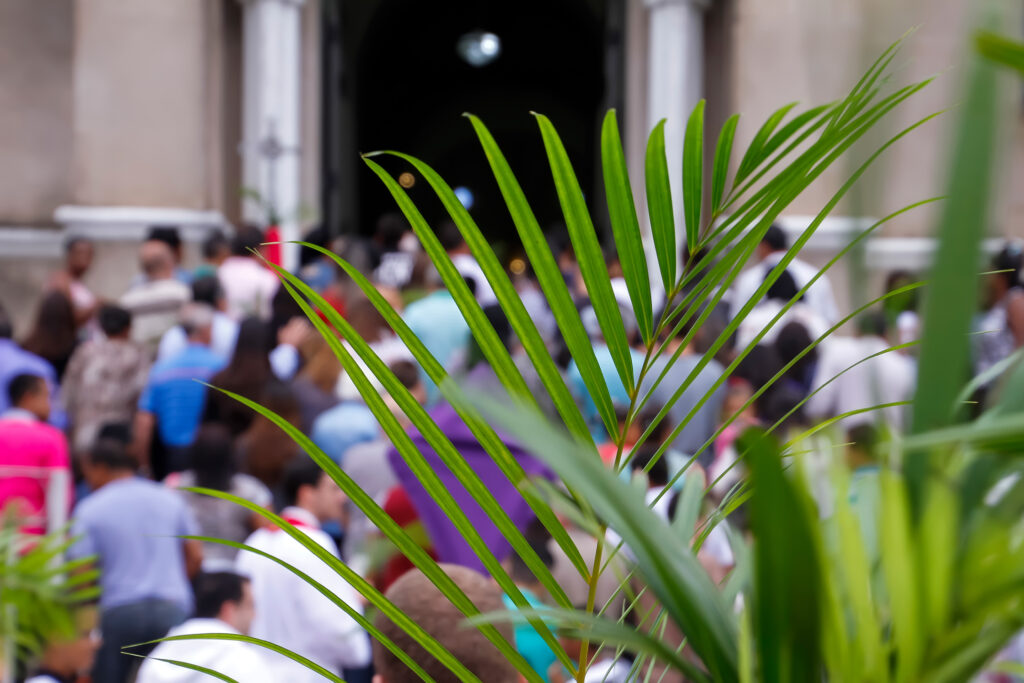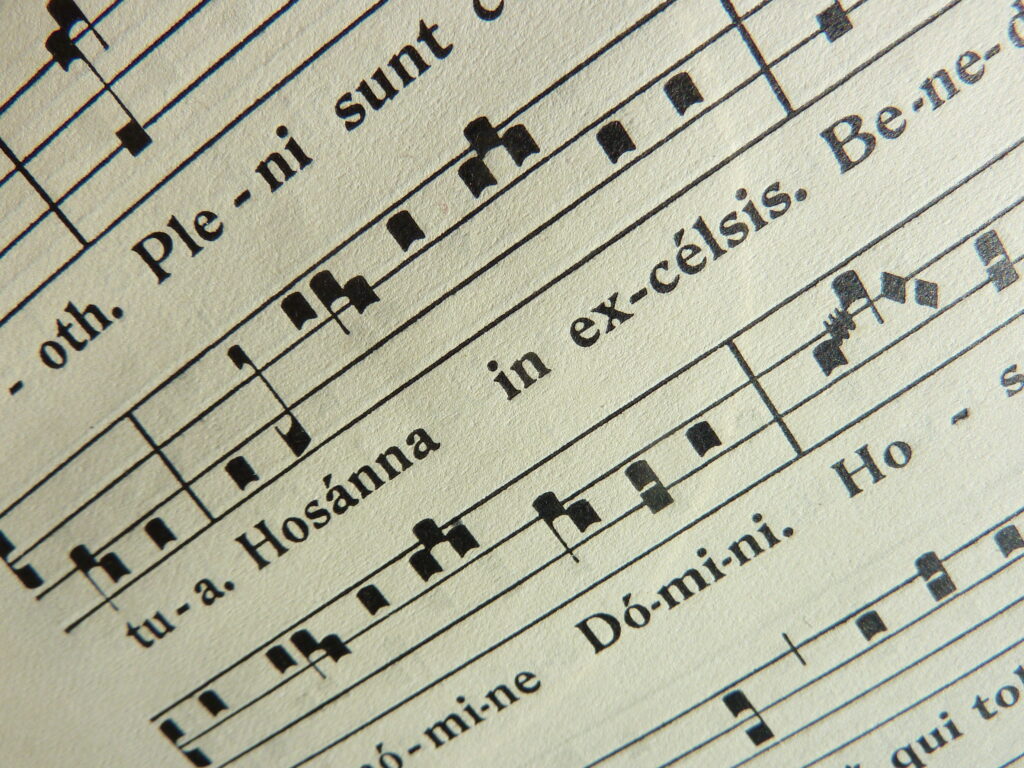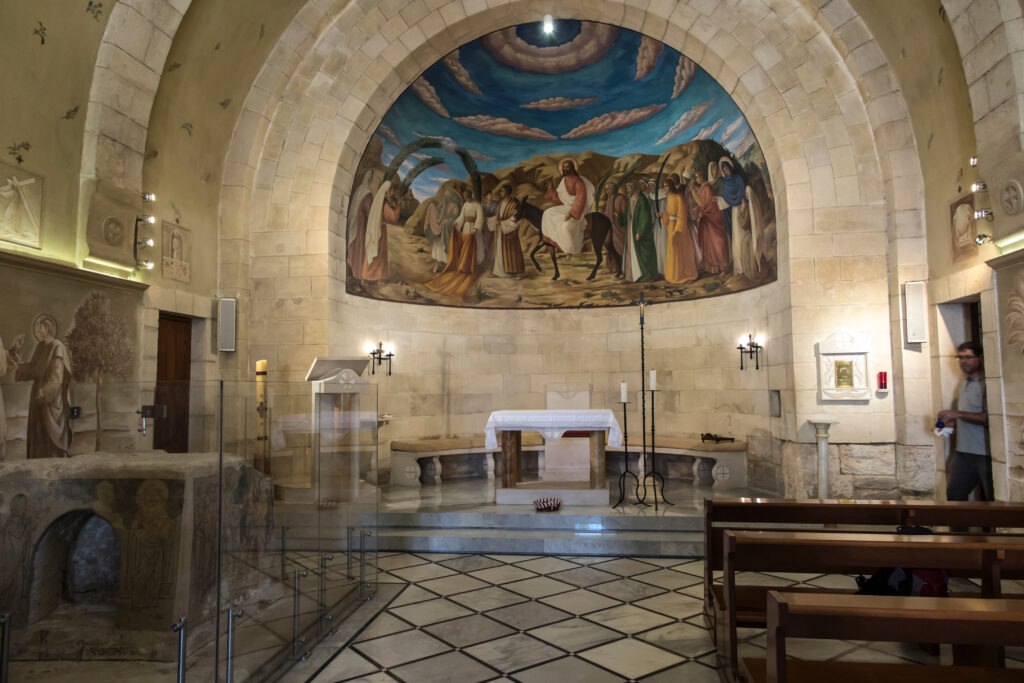Hosanna Meaning in Hebrew
You have probably heard the Hebrew word “Hosanna” before, but do you know what is Hosanna’s meaning in Hebrew?
The word usually brings to mind a very specific story from the Bible. In the gospel accounts, we read of Jesus arriving in the temple portico, through the gate called beautiful. He approached Jerusalem from the east, walking over the Mount of Olives before entering the city.
He arrived on a donkey (Matt 21:1-7), fulfilling the prophetic words of Zechariah 9:9:
“Rejoice greatly, Daughter Zion! Shout, Daughter Jerusalem! See, your king comes to you, righteous and victorious, lowly and riding on a donkey, on a colt, the foal of a donkey.”
Just then and there, the crowds shouted: “Hosanna!”, as they waved palm branches to greet him:
“Then the multitudes who went before and those who followed cried out, saying: Hosanna to the Son of David! Blessed is He who comes in the name of the Lord! Hosanna in the highest!” (Matt 21:9)
Matthew’s account of the triumphal entry, highlights the prophetic significance of this act, bringing in Zechariah’s words.
Is Hosanna’s Meaning in Hebrew an Expression of Praise?
I would imagine that a lot of us think of “Hosanna” as a shout of praise. We hear it in Christian worship songs, hymns, and maybe even Christmas carols.
If you attended Sunday school classes, you probably have vivid images of Palm Sunday events. The people welcomed Jesus in Jerusalem yelling out this word. Maybe even the kids in your class would shout along, Hosanna!
So, to many, it is an expression of jubilant praise.
Imagine yourself among the crowd of people, and as you open your mouth–the word Hoshi’ana escapes your lips. As you look around at the desperate faces around you, the true meaning of this Hebrew word pierces through your soul.
Hoshi’ana, save us!
Suddenly, “Hosanna” no longer sounds like a lighthearted expression of praise. You feel the weight of your humanity crushing you, as the hot sun bears down. “Save me, God! I need you!”, you feel the magnitude of these words as you wave your palm branch towards the Messiah.
Uttering these words, you realize they are an entreaty, a cry for help. They are more than a jubilant praise, and here is the One who is able to save.
What Does “Hosanna in the Highest” Mean?
In Matthew’s account of the triumphant entry, the throng of people gathered shouted “Hosanna in the highest!” So, what does that expression mean?
Scripture gives us some clues, for example in Psalm 141, when David entreats the Lord to listen to His prayer. He pleas that his prayer would be like incense rising up to the throne, and like an offering (Psalm 141:2).
The prophets and psalmists frequently cry out for the Lord to take note, hear and remember. And just like them, we too hope that our prayers are received at the throne of God. Before the Messiah was incarnate in the person of Jesus, temple sacrifices and offerings were the only way entreaties were brought to the Lord.
We know that the Lord is always close to the broken hearted. “Hosanna in the Highest”, while it appears to mean praise in the highest, it could also communicate a cry for help. It is like a call for rescue to reach the highest – a petition for salvation sent directly to the throne room of God.
A Call for Rescue
The Hebrews who raised their voices that day recognized their need. They were not blind to their helpless condition without a Savior, so they cried out “Hosannah!”
When I think of this story, at first, it’s easy to go back to the Sunday school illustrations. They displayed the scene so neatly, with bright colors and a lot of emotion. But when I think of crying for help, what comes to my mind is much more immediate and pressing.
Have you ever been approached by an unhoused person, clearly in distress, asking you for money, food or provision? Have you ever heard an elderly person with dementia cry out for help in their confusion, or the wail of a hungry newborn?
Their cries for rescue and help are so palpable and unmistakable. And that is what Hosanna truly means–please save me, help me, come quickly to my aid, and rescue me!
Is Hosanna Hebrew or Greek?
The original word, Hoshi’ana, is Hebrew and Aramaic, and means “save us, we beseech thee.” The simplified spelling, Hosanna, is based on a Greek transliteration of this Hebrew expression.
As mentioned previously, it is most known for appearing in each of the four Gospels, when the writers describe Jesus’ triumphal entry into Jerusalem. But the word also appears in the Old Testament, for example in Psalm 118:25 as an entreaty.
Psalm 118 is a psalm of deliverance, so parts of it are read during the Passover seder. As a whole, it speaks to the Lord’s power to save and deliver in the face of immediate danger and distress.
In other instances, like in Psalm 86:2 or Jeremiah 31:7, it means to save, which describes the Lord turning Israel’s lament into joy.
“Bow down Your ear, O Lord, hear me; For I am poor and needy. Preserve my life, for I am holy; You are my God; Save Your servant who trusts in You! Be merciful to me, O Lord, For I cry to You all day long.” (Ps 86:1-3, emphasis added)
“For thus says the Lord: Sing with gladness for Jacob, and shout among the chief of the nations; Proclaim, give praise, and say, ‘O Lord, save Your people, the remnant of Israel!’” (Jer 31:7, emphasis added)
Hosanna Meaning in Hebrew Culture
In Rabbinic literature, the phrase occurs in the expression: “Hoshanah Rabbah”. It is used on the seventh day of the Feast of Tabernacles, also known as Sukkot.
During the festival of Sukkot, we remember that this world is not our permanent home. We long for the Messiah, and the peace He will bring when He establishes His Kingdom here on earth. What is more, this is a longing that is shared by Jews and Christians.
Thus, Hoshanah Rabbah is the culmination of the festival, when we implore for the Messiah to come. It is also viewed as a “mini Yom Kippur”, since in Rabbinic Literature it is seen as the day when submitted prayers and petitions are received.
Why Did People Cry Hosanna to Jesus?
As the pilgrims gathered to welcome Jesus, they greeted him with a messianic presentation. They saw the Messiah as a humble ‘peasant’ king, riding a donkey, just like Zechariah described. It gave them hope.
The people lived under the Roman rule, in political turmoil, in a fragmented society, with many religious and ideological differences. They believed that the promised king would deliver them from the oppressor and untie them under the new Davidic Kingdom.
John’s account of the Triumphal Entry also tells us that this crowd witnessed Jesus raising Lazarus from the dead and were inspired by this miracle. (John 12:17-18) So, as they cried Hosanna, they put their hope in Him to save them and unify them.
By greeting Jesus with palm branches, the people were publicly acknowledging Him as a redeemer. Hosanna’s meaning in Hebrew really works here. Like when Elisha anointed Jehu to avenge those killed by Jezebel (2 Kings 9:1-13), the crowds spread their cloaks on the road and greeted him with leafy branches.
Jehu was avenging those killed by Jezebel and was anointed in the way a king would be anointed (Coogan 79). Meanwhile here, we see that the people recognized who Jesus was, at least at the time, and they cried out to him in their desperate need.
What “Hosanna” Means to Me and You
Most of us today might feel far removed from these Galilean worshippers. In many ways, we have fairly “put together” lives, or at least it appears that way, because we lived in civilized societies. But we all hunger and thirst for something, even if we don’t vocalize what it is.
Maybe you have also been pushed past your breaking point in life, pushed past hope, into desperation, just like the Jerusalemites in Jesus’ way. You are searching for mercy and meaning in a world that values human life less and less every day.
Many today are looking for a hero, a savior, but they cast their eyes to political leaders, celebrities, maybe even just the loudest voice in the room. But these people, despite their influence, do not have the power to save.
The Messiah Jesus does, so that is why we, along with the crowds in the temple court, cry out to Him, Hosanna! And we put our hope in Him.
Do the Jewish People Use the Hebrew Word Hosanna?
While Hosanna has become somewhat a part of the English parlance, as we are familiar with it from Christian worship, hymns and more, the Jewish people also use hosanna, or its equivalent hoshi’ana, commonly in prayer and liturgy. Hosanna’s meaning in Hebrew has much depth.
Hoshanah is a series of prayers and liturgical poems that call upon God to save and redeem Israel. Psalm 118, mentioned previously and featured significantly in the Passover Haggadah and liturgy, deals with themes of longing, hope, and restoration.
When we remember the Passover story, we are recalling not only the event of the Exodus from Egypt. The Lord heard the groaning of the Israelites who did heavy labor and suffered under Egyptian rule. He sent Moses to deliver them and lead them to the Promised Land.
Passover should remind us of the Messiah Jesus who is our Passover Lamb and delivers us from our sin and sorrows. We know that the Messiah Jesus is the one the Scriptures wrote about, and is the one who can save us.
So with one voice across the generations, in anticipation of the Holy Week, we cry: Hosanna!
Crying Hosanna on Palm Sunday
Today, we can all join the Hebrew worshippers in crying: Hosanna! God Save! Messiah, save us! Because of Hosanna’s meaning in Hebrew, it holds the same relevance for us today.
Although the ones who greeted the Messiah in Jerusalem those many centuries ago, expected Him to become a general and conquer the Romans, we know that so much more was accomplished.
That same week, Jesus’ work on the cross conquered sin for anyone who would believe, and three days later, He overcame death to give us life.
Today, many followers of Jesus from all nations and walks of life, wave palm branches and singing Hosanna on the streets of Jerusalem on Palm Sunday. We can join in their Hosanna, because we have hope in Him, who is the same yesterday, today, and forever.
See how believers from the land and the nations celebrate Palm Sunday in Jerusalem: https://www.youtube.com/watch?v=HF0cR3j44_M.

7 Hebrew Words Every Christian Should Know: Free PDF Download
With the use of the Hebrew language God revealed Himself to mankind. This ancient tongue held the greatest spiritual truths that guided our lives through the ages. And in each generation, they are discovered anew.
We know the Bible can be hard to understand and you want to get more out of it. Which is why we want to teach you seven Hebrew words that will transform the way you read the Bible.
Articles Related to What does the word Hosanna mean?
Estimated reading time: 10 minutes
Reference
Coogan, Michael (Ed.) (2001) The New Oxford Annotated Bible. Oxford University Press. New York, NY


